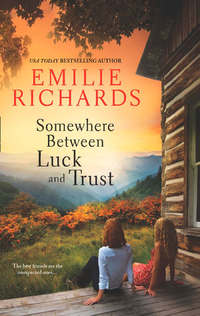
Полная версия
No River Too Wide

Some betrayals are like rivers, so deep, so wide, they can’t be crossed. But—for those with enough courage—forgiveness, redemption and love may be found on the other side.
On the night her home is consumed by fire, Janine Stoddard finally resolves to leave her abusive husband. While she is reluctant to involve her estranged daughter, she can’t resist a chance to see Harmony and baby Lottie in Asheville, North Carolina, before she disappears forever.
Harmony’s friend Taylor Martin realizes how much the reunited mother and daughter yearn to stay together, and she sees in Jan a chance to continue her own mother’s legacy of helping women in need of a fresh start. She opens her home, even as she’s opening her heart to another newcomer, Adam Pryor. But enigmatic Adam has a secret that could destroy Taylor’s trust…and cost Jan her hard-won freedom.
Praise for the first of the Goddesses Anonymous novels
by Emilie Richards
“Richards creates a heart-wrenching atmosphere that slowly builds
to the final pages, and continues to echo after the book is finished.”
—Publishers Weekly on One Mountain Away
“Complex characters, compelling emotions and the healing power of forgiveness—what could be better? I loved One Mountain Away!”
—New York Times bestselling author Sherryl Woods
“Emilie Richards’s compassion and deep understanding of
family relationships, especially those among women, are the soul of
One Mountain Away. This rich, multilayered story of love and bitterness, humor, loss and redemption haunts me as few other books have.”
—New York Times bestselling author Sandra Dallas
“When I first began reading One Mountain Away, I wondered where the story was going. A few pages later, I knew precisely where this story was going—straight to my heart. Words that come to my mind are wow, fabulous and beautiful. Definitely a must-read. If any book
I’ve ever read deserves to be made into a film, One Mountain Away is it! Kudos to Emilie Richards.”
—New York Times bestselling author Catherine Anderson
“Emilie Richards is at the top of her game in this richly rewarding tale of love and family and the ties that bind us all. One Mountain Away is everything I want in a novel and more. A must-buy!”
—USA TODAY bestselling author Barbara Bretton
“Emilie Richards has written a powerful and thought-provoking novel that will both break your heart and fill you with hope.
Richards’s characters become your friends, and they will stay with you long after you turn the last page. A beautiful book.”
—National bestselling author Diane Chamberlain on One Mountain Away
No River Too Wide
Emilie Richards

Dear Reader,
How does the author of a series, like Goddesses Anonymous, choose which characters to feature next? If you read One Mountain Away or Somewhere Between Luck and Trust, then you know half a dozen women are introduced who loosely band together to reach out to other women in turmoil. So how did I decide which ones in this ever-widening circle to feature in No River Too Wide?
Have you ever been in a conversation with a friend who tells you the gripping tale of another woman’s life, then stops before the end? On the edge of your seat you ask her to continue, and she tells you sadly that she can’t, because she doesn’t know the ending. You’re riddled with frustration, right? Because you need to know!
If you’ve had that experience, then you understand why I couldn’t introduce Harmony’s mother, Janine, in passing—as I did in One Mountain Away—and not learn more about her. We know Janine’s trapped in a nightmarish marriage. We know that despite this, she did everything she could to give Harmony the start she needed to grow up and finally move far away.
But that smidgen of a story wasn’t enough. Domestic abuse is a difficult subject, but sadly it’s all too real. Over a million women are assaulted by their partners every year, and yes, 85% of domestic violence victims are women. The statistics are grim and worth your exploration, but this book isn’t about statistics. No River Too Wide is a story of triumph, of a woman moving beyond her terrifying circumstances and regaining control of her life.
Women can, especially if they have help.
As I thought about Janine and Harmony, about bad marriages and good ones, I found I needed to explore the way we women choose the men in our lives, and how we learn to make good choices and avoid bad ones.
My story was born.
The River Arts District of Asheville, North Carolina, where Taylor’s fictional health and wellness studio, Evolution, sits above the French Broad River, is real. The week I was in Asheville for research, the river overflowed its banks and seeped into far too many artists’ studios. Despite that rare occurrence, the District is definitely worth a visit. The studios are fascinating, and the personable artists are willing to stop and chat about their work. I hope you’ll find the time to visit someday.
Good reading,
Emilie
To women everywhere who work tirelessly and creatively
to help other women who need them
Contents
Dear Reader
Chapter 1
Chapter 2
Chapter 3
Chapter 4
Chapter 5
Chapter 6
Chapter 7
Chapter 8
Chapter 9
Chapter 10
Chapter 11
Chapter 12
Chapter 13
Chapter 14
Chapter 15
Chapter 16
Chapter 17
Chapter 18
Chapter 19
Chapter 20
Chapter 21
Chapter 22
Chapter 23
Chapter 24
Chapter 25
Chapter 26
Chapter 27
Chapter 28
Chapter 29
Chapter 30
Chapter 31
Chapter 32
Chapter 33
Chapter 34
Chapter 35
Chapter 36
Chapter 37
Chapter 38
Chapter 39
Chapter 40
Chapter 41
Acknowledgments
Questions for Discussion
Chapter 1
In an Oscar-worthy performance, Harmony Stoddard put all the enthusiasm she could muster into her voice. “I just know you’re going to love spending time with your grandma, Lottie.”
In reality she wasn’t sure that her nine-month-old daughter, happily exercising her chubby little legs in her bouncy chair, was going to love the upcoming visit one bit, but she continued the charade.
“And your daddy will be there. You remember Davis, right? You’ve seen him twice. He even held you once.”
Of course, not with any enthusiasm, but Harmony’s job was to ready Lottie to be carried off by strangers and to make her baby girl think this was going to be a terrific afternoon. By her own critical standards, she was doing an admirable job, even if she was developing a roaring headache from the effort.
She wasn’t surprised at the good face she was able to put on upcoming events. After all, she had been raised by a mother able to turn a day rimmed with fear and foreboding into an adventure. So many afternoons she and Janine had baked cakes and cookies, or set the dinner table with their best china and carefully folded napkins, pretending they were a normal mother and daughter brightening their happy little home.
In reality, of course, their preparations had only been a pantomime. Pretending all was normal had helped them get through the hours until Rex Stoddard walked through the door to lavishly compliment them or—more memorably—knock Janine to the floor.
Sadly, Janine Stoddard wasn’t the grandmother on her way to see Lottie. That grandmother, Grace Austin, was Davis’s mother. Lottie’s father had only recently gotten around to telling his family about his nine-month-old blessed event. Harmony didn’t know if her ex-boyfriend had been too embarrassed, or if the baby’s arrival had simply slipped his mind.
Whatever the reason, Davis’s father had no interest in meeting Lottie, but his mother was curious and expected Davis to produce her new granddaughter. So producing Lottie was the activity of the day.
“Let’s make sure we have everything you need,” Harmony continued in her own mother’s chirpy counterfeit voice. “Diapers, just in case one of them is willing to change you. Your sippy cup. Spring water. Snacks you can feed yourself.”
She paused a moment, wondering how that would work. Would Davis and Grace let messy little Lottie experiment with the lightly steamed vegetables Harmony had prepared, the little squares of whole wheat toast? Or would they lose patience and feed her French fries or crumbled-up hamburger from whatever restaurant they took her to?
The mystery was about to be solved. The bell at the bottom of the stairs pealed, and Velvet, Harmony’s golden retriever, who had been sleeping on the sofa, gave one sleepy bark before closing her eyes to finish her nap.
Harmony took a deep breath. For better or worse, Lottie was Davis’s daughter. Harmony had no right to dictate everything he did with her. After all, he did send regular support checks. Of course, if he didn’t, he would have to explain his reasons to his stodgy employer when the state of North Carolina garnished his paycheck.
“Okay, off we go.” She lifted the baby into her arms and settled her into the car seat to carry her downstairs. Harmony had insisted that Davis check the manuals for his car and the car seat to be sure he could use it safely. Luckily his Acura was new enough that she didn’t really have to worry, which was a good thing, since she doubted he had bothered with his homework.
The doorbell rang again, longer this time, followed by a third blast. She smoothed the wisps of pale brown hair off Lottie’s forehead, then hoisted the car seat and the diaper bag and carried both to the door, nudged it open with her hip and peered down at him.
“It takes a minute to get her into the seat, so next time you can ring once, Davis. If you’d like to take the diaper bag, that would help.”
Davis, good-looking in a brooding sort of way, deepened his perpetual frown, but he came up the steps, stopped just below her and held out a hand. She swung the diaper bag in his direction, and he caught it. She followed him down, taking her time so she could grasp the rail. The stairway up to her garage apartment was wide and as safe as any outside stairway could be, but she always took her time, even when she wasn’t carrying precious cargo.
The woman waiting at the bottom of the stairs was obviously Grace. She had the same vaguely dissatisfied expression as her son, the same dark hair, the same impatient, almost jerky, movements. Although she smiled politely, her eyes didn’t change. She was examining Lottie, and not with grandmotherly affection.
“She seems small for nine months,” Grace said. She didn’t bother to smile at the baby, who was playing with a ring of plastic keys Harmony had given her. She continued her assessment. “Davis had more hair.”
“I probably had less,” Harmony said, struggling not to dislike Lottie’s grandmother on sight. “She is small, but well within the normal range.”
“Davis was walking by the time he was that age.”
“You must have had your hands full.”
Grace gave a humorless laugh. “We had a nanny until he was five, so my hands were full with better things. His father and I both traveled frequently for business.”
“I’m sure she took excellent care of him.”
“Of course she did,” Grace said with obvious irritation. “We made sure of it.”
Harmony thought one response was as pointless as another, so she gave none at all.
“We’ll bring her back in a couple of hours,” Davis said quickly, as if even he had picked up on his mother’s animosity. “Mother’s flying out early this evening. This is just a brief visit.”
Harmony managed a tight smile. “I’ll be waiting, and I’ll have my cell phone with me if you have any questions.”
“Oh, I think we can manage,” Grace said. “Davis’s sister has two children, and we see them frequently. Of course, that situation is very different. They live in a two-parent family.”
“There’s no point in bringing that up.” Davis sounded annoyed.
“Why not? It’s the truth. Your father and I are happy to be seen with them. We can show them off to our friends.”
The rest of the sentence was unspoken but clear. Not like this one.
“Your son proposed, and I declined,” Harmony said, “so don’t blame him. I hope you won’t punish Lottie. Times have changed, and there are plenty of unmarried parents raising children.”
“I doubt you have any idea what I consider appropriate.”
Enough was enough. Harmony lifted her chin. “I doubt that I want to.”
“Let’s go,” Davis told his mother. “As usual you’ve thrown a damper over the afternoon. Let’s see what we can salvage.”
Grace just smiled, as if his words had been a compliment.
Harmony watched them head toward Davis’s car, and for the first time she felt a twinge of sympathy for Lottie’s father. She’d just gotten a peek into Davis’s childhood, and while the scenery surrounding him had probably been lovely, the actors and script had been B-movie grade, at best.
As Harmony watched, Grace got into the passenger’s seat, leaving her son to set the car seat on the ground, open the rear door and finally juggle it inside to begin the process of trying to fasten it in place.
Like her own mother, Harmony yearned for the best in bad situations, so she had foolishly hoped Grace would welcome Lottie and shower the baby with unconditional love. Instead, it was clear Grace and Davis would take Lottie to a restaurant closer to Asheville, do their familial duty and return her well ahead of schedule. Their visits—if Grace visited again—would always be short and stressful. Eventually Lottie would refuse to go with them.
Harmony had chosen a real winner when she’d moved in with Davis almost two years ago.
“Men...”
Not for the first time she wished her own mother could be here with her. Without a doubt Janine Stoddard would fold her baby granddaughter into her arms and smother her with all the love she had to give–and was so rarely allowed to.
But that, too, was a bad situation with no “best” to hope for. Right now, in a secluded house in Topeka, Kansas, her mother was probably preparing dinner for Harmony’s father, hoping as she struggled for perfection that tonight Rex Stoddard would praise what she cooked and otherwise leave her in peace.
Sadly Harmony could only guess, because she hadn’t talked to her mother in over a year. The last time she’d tried, Janine had told her never to call home again.
Chapter 2
From the audio journal of a forty-five-year-old woman, taped for the files of Moving On, an underground highway for abused women.
I was a happy child. My father worked in a factory, and my mother was a dressmaker who sewed and made alterations in a corner of the bedroom she shared with my father. She was always home when I returned from school. There were homemade cookies waiting and open arms for my friends.
Most of the money Mama made was turned over to my father, who decided how to spend it, but her wishes were always taken into account. Daddy was a kind man, generous in every way, who found joy in providing for his family and keeping us safe from harm. When our front door was closed at night, love, not fear, was locked inside with us.
Every Sunday we attended a church where God’s mercy was preached from the pulpit. Every Monday I walked through a neighborhood of small, tidy houses to a school where I was expected to do my best. While neither of my parents had gone to college, they saved what money they could to guarantee I did. They wanted to give me the best.
Had they lived, my life would have been different, but in my third year of college, as they were on their way to visit me, a car traveling in the other direction crossed the interstate median directly in their path. The cars exploded on contact, ending a midday drinking binge for the driver and the lives of both my parents.
The accident left me without a compass. My sheltered background left me with little insight into people who were not decent and well-meaning. My parents left me with a yearning for what I had lost, but sadly they left me when I was too young to understand the difference between a marriage based on respect and one based on fear.
By the time nine months had passed, I had learned.
One month after their deaths, the Abuser came into my life.
* * *
Rex had done this before.
At two a.m., as she tossed underwear and socks into a canvas backpack, Janine Stoddard reminded herself this was not the first time her husband had stayed away all night without warning her ahead of time. Keeping her off guard was part of a strategy to keep her from leaving him. Sometimes, by piecing together hints in later conversations, she’d even concluded that Rex had stayed close to the house the whole time to see what she would do in his absence.
It wasn’t enough that she obeyed every whim when he was at home. He wanted to be sure she followed his orders when he wasn’t, too.
While their son, Buddy, was still alive, Rex had never needed to worry. At the first sign of his mother’s defection, Buddy would have called his father. Of course, Rex’s faith in Buddy had never been put to the test. Janine had loved her son too much to put that kind of pressure on him.
She couldn’t think about Buddy. Not now.
It was possible Rex was observing her right this minute. He might be in his car in a vacationing neighbor’s driveway, eyes trained on the road to see if Janine tried to slip away. He might even be camping in the woods behind their house, with binoculars and night-vision goggles. Rex considered himself something of a survivalist, and while he was too much of a loner to drill on weekends or join a militia, he collected survival gear the way some men collected fishing lures or model airplanes. He kept all his equipment under lock and key in the same room where he kept an arsenal that included an AK-47 and an assortment of Rugers and Remingtons.
He liked to tell her exactly what each gun could do. Sometimes he gave his lectures with the gun pointed directly at her.
For a moment she was frozen in place, one hand raised toward the dresser, as she thought about those guns. Was she insane? Did she really believe that after all these years she might be able to pull this off? That Rex had really been fooled by her eager attempts to please him, by her waning interest in anything that wasn’t centered on his needs, by her reluctance to go out in public without him?
For months now she had carefully waged a campaign to make her husband think his efforts to turn her into one of the walking dead had succeeded at last, that there was nothing left inside her except a desire to please him. The masquerade had given her hope and a reason to live. Having a plan, even a sliver of one, had slowly reinfused her with energy and purpose. As she had pretended to sink lower and lower, she had watched his reaction and gauged his state of mind.
Rex had believed her. She was almost certain. After all, not to believe would have been an admission that twenty-five years of his best efforts to subdue her hadn’t borne fruit. He had set out to change his wife to suit his every need, and Rex Stoddard succeeded at everything he set his mind to. He was so superior to those around him that even the possibility he might fail never really entered his mind.
She had known that. She had used that.
But had she really convinced him? If she had, where was he tonight?
One more time, just one more, Janine forced herself to consider other possibilities. Rex wasn’t a drinker. Had he been hurt, the police or the hospital would have called her. If his car had broken down on the way home from work, he would have driven home in a rental car, angry at the world and anxious to take his frustrations out on her.
She squeezed her eyes shut and forced herself to picture the best scenario. Rex had probably gone off on an overnight business trip, as he was sometimes forced to. Truckers and trucking firms in the Midwest were the primary clients of Rex’s insurance agency, and occasionally it was necessary to visit in person to settle claims or sell policies. He hadn’t told Janine he was leaving, because he wanted her to think he was still in town, eyes trained on her from some hidden location.
Janine reminded herself that she had carefully practiced her escape. Her husband’s most powerful weapon was fear. Most likely he would saunter in for dinner in about sixteen hours as if nothing had happened. With luck Rex was sure by now that there was no longer a reason to watch her. As long as she thought she was being watched, she would never leave.
No, even though her escape plan hadn’t been fully activated, even though she still had weeks before every tiny detail was put in place, now was the time to go. She had been given a chance, something she had prayed for back in the days when she believed in prayer. If she let this moment slip by, there was no telling when she might be given another.
Fumbling in the dark with the assistance of a penlight, she continued packing. She didn’t have time to bring much. For months she had made a mental inventory of essentials, knowing it was too dangerous to pack before it was time to go. Instead, she had rearranged her drawers so the important things would be easy to find quickly.
Now she mentally reviewed the list as she stuffed items inside a canvas backpack Buddy had once used for scouting. Her watch. A nightgown that was the last gift her daughter, Harmony, had given her before leaving home. Two T-shirts, one pair of pants thin enough to roll. She finished with two letters her parents had written her when she was still in college. For years she had safely kept them in a county fair cookbook that Rex never opened, only daring to move them recently in preparation for this moment. Rex had “encouraged” her to forget her past. Had he found the letters, he would have destroyed them.
Once she was in the bathroom, packing toiletries was easy. She had moved the items she needed into one drawer in the vanity, and now she removed the drawer and dumped everything into her backpack. Then she knelt, reached through the opening where the drawer had been and peeled away an envelope of cash that had been taped to the wall along with a checkbook linked to a secret savings account.
The cash would help her get out of Kansas. The savings account would help her start a new life in New Hampshire, where she had never been and never wanted to go. New Hampshire, which had one of the lowest number of truck and tractor registrations in the nation.
New Hampshire, where she might be safe.
She rested the backpack against the wall and stepped into the closet to dress. The night air was cool, not cold, but she chose corduroy pants, a black turtleneck that she topped with a heavy black sweater and ankle boots. Nothing fit. As part of her plan, she had lost almost twenty pounds. Now when she looked in the mirror she saw a hollow-eyed woman with lank graying hair and cheekbones so sharp they looked as if they might do damage to the skin stretched over them. She looked beaten and defeated.










